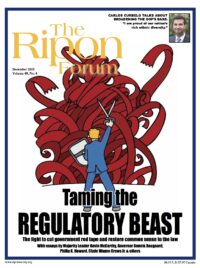
Too often, American businesses are targeted by bureaucrats and regulators. Webs of red tape ensnare corporations and small mom-and-pop shops alike, and companies are faced with the tough choice of whether to continue running their businesses. The nameless, faceless government agencies that dole out staggering amounts of rules have morphed into a fourth branch of government; one that is not elected by nor representative of the American people. Ahead of this year’s Thanksgiving, President Obama announced 2,224 federal regulations, which according to the American Action Forum, totals the number of 2015 regulations to 72,989 pages. Government regulations stifle innovation and increase the cost of doing business, and it is time to roll back the federal regulatory agencies that have little oversight and wield too much power over America’s innovators.
Similar to The Ripon Society, the American Legislative Exchange Council (ALEC), of which I am CEO, brings stakeholders together to create a government that is more efficient, effective and accountable to the people it serves. ALEC members discuss the best solutions to state issues, and nearly one quarter of all state legislators are members of ALEC, many of whom go on to hold positions in higher office. Four of the presidential candidates are ALEC alumni, and seven alumni are sitting governors. The unique ability of ALEC to bring together state legislators, industry leaders and policy experts to discuss ideas about limited government, free markets and federalism is unparalleled.
Members of ALEC fight everyday against government overregulation. A recent report by the Competitive Enterprise Institute estimates the cost of federal regulations in 2014 amounted to $1.88 trillion. This cost breaks down to about $15,000 per household and comes in the form of lost economic productivity and higher prices on goods and services. The crushing regulations on American entrepreneurs are symptomatic of a government that has grown too big and too power hungry. This new fourth branch flies in the face of the American Dream.
Government regulatory agencies have grown so large that they are quickly outpacing President Obama’s economy. Since President Obama took office, the economy has grown at a measly average rate of 1.5 percent. Meanwhile, U.S. regulatory compliance costs have soared and would be the tenth largest economy if they were a country, with the costs exceeding the GDPs of Australia and Canada. A report by Open The Books found that if EPA was a law firm, it would be the 14th largest firm in the United States. Its $8.13 billion budget is more than the budget of eight states.
Business-oriented and free market governors are working alongside ALEC members and alumni to combat overregulation. Governor Rick Snyder created an office to oversee the rulemaking process for Michigan, and since the creation of the office in 2011, the state has enjoyed a net reduction of more than 2,000 regulatory rules.
Massachusetts Governor Charlie Baker pushed back against the culture of regulation this year by signing an executive order that requires government regulations to be reviewed on a regular basis, assessed for their effects on businesses and the economy and eliminated if proven inefficient. Governor Baker and Governor Snyder’s commonsense approaches to government regulations are a model for good government.
There is a role for regulations that genuinely and effectively protect public safety. But increasingly, regulations have become a means for government agencies to manipulate the private economy or pick winners and losers. In response to these affronts to businesses and entrepreneurs, ALEC has worked with state policymakers to create the ALEC model Regulatory Review and Rescission Act, which requires agencies to conduct regular reviews of regulations and sunset those that are overly costly or obsolete. Since the adoption of the ALEC policy, Rhode Island, Arizona and Pennsylvania have passed similar legislation.
Another model policy created by ALEC members is the Regulatory Flexibility Act, which helps minimize the impact of regulations on small businesses. More than half of small businesses fail within their first five years, and government should encourage, not hamper, their ability to succeed.
Government unfortunately has mistaken regulating for lawmaking, and the crushing weight of government intervention is the result. For the 72 federal laws passed in 2013, there were 3,659 rules issued. It has become clear that regulatory departments within the government have liberally interpreted the intent of legislation and usurped the power of the legislative branch. This fourth branch of government shifts wealth away from the job creators and redistributes it to the job regulators. The enormous economic and societal impacts of the regulatory culture created by this fourth branch can no longer be ignored.
With 2016 on the horizon, there are many issues on which the federal and state governments should focus, but easing the regulatory burden on America’s businesses and job creators should be a top priority.
Lisa B. Nelson is the CEO of the American Legislative Exchange Council (ALEC). Before joining ALEC, Nelson served as the Head of Government Relations, Americas for Visa, Inc.; Senior Vice President for External Relations, AOL Time Warner; Public Affairs Liaison to House Speaker Newt Gingrich; and as Executive Director of GOPAC.




